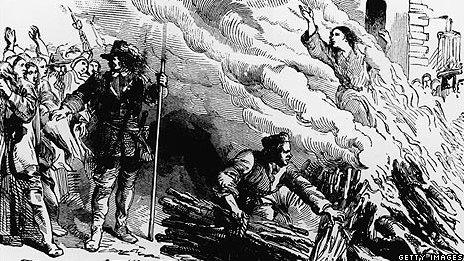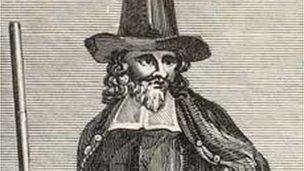The woman who became a witch-pricker
- Published

Witch-prickers are the stuff of horror films. A man in the tall hat and the dark cloak of a Puritan who comes to town to terrorise helpless women. But what if the witch-pricker was actually a woman in disguise? In Scotland, in 1662, that's exactly what happened.
A woman named Christian Caddell had watched one of Scotland's most famous witch-prickers at work, and thought 'I could do that!'
There was one problem: at this time most normal jobs were men only.
This was an extraordinary job. But by dressing as a man, she got away with it.
Perhaps folk did not pry too closely into the affairs of witch-prickers.
But what did a witch-pricker do?
The strange thing is that it was once considered as safe in court as modern DNA tests.
The pricker tested for the devil's mark, a spot on the body where a pin could be slipped in without bleeding or pain.
This was seen as proof that the witch had contracted with the Devil, getting powers to harm her neighbours with her spells.
The pricker stripped the victim naked and shaved them from top to toe.
Then the pin was pushed in, again and again, until the right spot was found.
And it wasn't a little dressmaker's pin, but a thicker hand-made pin, several inches long.
We all have spots on our body which are surprisingly insensitive, but there was a psychology to this.
In a society which prized modesty, women were stripped naked in public and handled all over their bodies.
This was humiliating sexual abuse. Many would confess just to make it stop.
So how does a woman get into this line of work?
Feared witches
The recent civil wars had shaken the north east Scotland county of Moray to the core.
Landowners were heavily indebted and quick to accuse their hard-pressed tenants of revenge with black magic.

The popular image of a witchfinder is a Puritan man
They feared witches as we fear child killers.
So when Christian - now "John Dickson" - turned up in March 1662 in Elgin, the law was only too pleased to see her.
The Baillie of Spynie, John Innes, a local power-broker signed her up.
And what a contract it was - six shillings a day maintenance and £6 pound Scots per witch with the mark.
At a time when the ordinary wages for a man were about a shilling a day, these were huge sums.
Christian was bought out for a year. There followed a reign of terror where she pricked witches as far north as Tain.
One of her victims may have been the famous witch Isobel Gowdie, the woman whose confessions give us the notion of a 'coven'.
Isobel was accused of cruelly killing the babies of her laird with fevers.
Wrong person
You may imagine the mother of those babies was very glad to see "John Dickson" witch-pricker and to hope her next baby might live, but then Christian went too far.
In Tain she pricked the wrong person - a man called John Hay.
He was a court messenger, who had the prestige of a job which bore the royal coat of arms and a little legal knowledge too, unlike her earlier victims.
He successfully petitioned the government for her arrest.
Easier said than done. Christian had skipped on to new patrons.
Now she was involved in a clan battle, a highland clearance by witch accusation, where the Chisholms accused their Maclean tenants of sorcery.
A whistleblower reached their chief - Maclean of Duart. Now he petitioned the government too. Christian's luck ran out.
Cruel irony
She was imprisoned in the tolbooth of Edinburgh, and at last her sex was discovered.
But Christian was fake in more ways than one.
She now confessed she wasn't discovering witches by pricking at all, she was telling by looking in their eyes.
This was more like witchcraft than witch-pricking.
However Christian escaped the fate of her victims.
She was sentenced to transportation to the fever-ridden plantations of Barbados, where she could expect a short hard life even if she survived the voyage.
Here Christian vanishes from history.
But there's one last cruel irony.
She was transported on 4 May 1663, the day her last victims were burned in Forres.
She had helped claim at least six and perhaps even as many as 10 innocent lives.
Women with a past - Christian Caddell - is on BBC Radio Scotland at 14:05 on Monday 19 November.